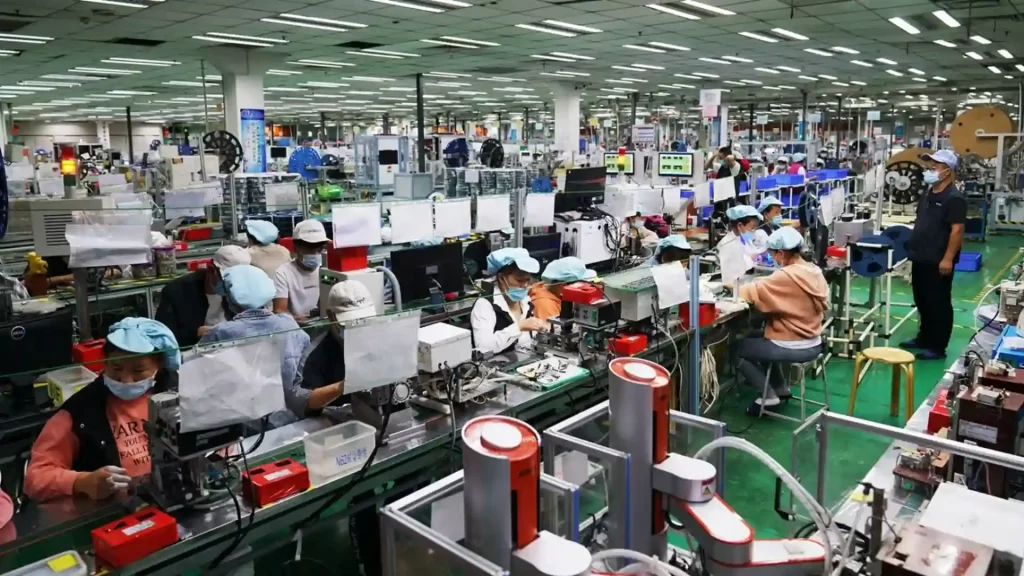China detains iPhone maker workers in ‘strange’ case
3 min read

In a surprising turn of events, four workers from Foxconn, the Taiwanese company renowned for manufacturing iPhones, have been detained by Chinese authorities in what officials in Taipei have described as a “strange” case. The arrests took place in Zhengzhou, Henan province, and were reportedly linked to charges of “breach of trust,” according to Taiwan’s Mainland Affairs Council.
Foxconn, the largest producer of iPhones for Apple, is one of the world’s largest employers, operating extensive manufacturing facilities across China. The Taiwanese government has raised concerns about the potential misuse of power by Chinese police in this situation, suggesting that such actions could undermine business confidence in the region. The case has sparked speculation about the broader implications for Taiwanese companies operating in China, particularly given the complex geopolitical landscape between the two sides.
A spokesperson for China’s Foreign Ministry stated that they were not familiar with the specifics of the detentions, leaving many unanswered questions. This incident follows an investigation initiated by Chinese tax and land authorities against Foxconn in October of the previous year, coinciding with the presidential campaign of Foxconn’s founder, Terry Gou, who was running as an independent candidate in Taiwan. This context raises further questions about the motivations behind the current detentions.
In light of escalating tensions, Taiwan has recently advised its citizens to “avoid non-essential travel” to mainland China, Hong Kong, and Macau. This advisory comes after Beijing introduced stringent guidelines that include criminal penalties for individuals labeled as “diehard Taiwan independence” supporters. Such developments have intensified the scrutiny of Taiwanese nationals and businesses in China.
Foxconn’s Zhengzhou facility, often referred to as “iPhone City,” is the largest iPhone manufacturing site globally, employing hundreds of thousands of workers. Despite ongoing tensions between Beijing and Taipei, many Taiwanese businesses, including Foxconn, have established operations in China, drawn by the vast labor pool and manufacturing capabilities.
The relationship between China and Taiwan remains fraught, with Beijing considering Taiwan a breakaway province that will ultimately be reunited with the mainland. This perspective is met with resistance from many Taiwanese, who identify as part of a separate nation. While a significant portion of the population favors maintaining the current status quo—neither formally declaring independence nor pursuing reunification—tensions continue to simmer, complicating the landscape for businesses operating in the region.
The detentions at Foxconn highlight the risks that Taiwanese firms face in China, particularly amid a backdrop of heightened scrutiny and geopolitical strife. As the situation unfolds, it remains to be seen how these events will impact Foxconn’s operations and the broader Taiwanese business community in China.
As Taiwanese authorities closely monitor the developments, they are advocating for the protection of their citizens and businesses against potential overreach by Chinese officials. The implications of this case could reverberate beyond Foxconn, influencing the operational strategies of other Taiwanese firms in China and the overall climate for foreign investment in the region.
With the international community watching closely, this incident serves as a reminder of the intricate and often precarious relationship between Taiwan and China. As both sides navigate these complex dynamics, the outcomes of such detentions may influence future interactions and policies, ultimately affecting the broader economic landscape in East Asia.
In conclusion, the unusual detention of Foxconn workers serves not only as a troubling development for the affected employees and their families but also as a significant point of concern for Taiwanese businesses operating in China. The unfolding situation highlights the delicate balance that must be maintained in navigating the geopolitical tensions between Taiwan and China, as well as the potential risks that such tensions pose to economic collaboration and growth.